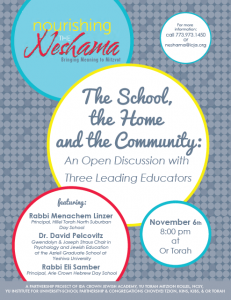May 9, 2014
The pursuit of uncool
By NEIL HARRIS
If you ask my wife and three kids (a boy, 14 and two girls, 11 and 7) if I am a good father, I’m not sure what they would answer. If you ask them if they think I’m a cool abba, they’ll tell you that I used to be cool. Being cool is a choice. I spent, what seems like months, saying to my own children. “Kids, I really am cool.”
I tried explaining to them about the glory of the 80s and how music was much better back then, especially the stuff that fell into the categories of college radio and punk. I tried showing them how a bunch of my friends all dressed differently than everyone else (we all mostly wore black…very original). I told my daughters that I had crazy hairspray and hair dryer skills that they couldn’t even dream about. It was never a conscious choice, but during high school and the beginning of college I was seen as being “cool.”
I know plenty of parents that go out of their way to appear cool to their kids. They might try to friend their kids and their kids’ friends on Facebook, be up on the latest music, novels, and texting abbreviations. If that works for you and the relationship you want to have with our kids, more power to you. I eventually gave up and just accepted the fact that I was no longer cool. I stopped trying to be cool in their eyes.
It was much easier than I thought it would be. However, I found that the choice of not being cool opened up a whole new avenue of going out of my way to be uncool. I had thoughts of calling my kids’ friends by nicknames that only I would understand. I had visions of interrupting play dates my kids had by doing the robot dance. To my family’s delight, I rarely acted upon these examples.
What I did implement was a conscious choice to show my kids that I wasn’t cool. Again, I am far from a model parent, but this mindset has fostered a more positive relationship with my kids. This was much easier than I thought in some aspects. My wife and I have always stressed to our children that there are things our family does and it might be a little different than other what other families do. There are TV shows, music, and movies that we feel are appropriate and others that are not. These decisions to be uncool, at times, are not easy, but my kids have learned that my wife and I are willing to listen to their points of view and if we are swayed to their side it is solely because they have valid reasons and not because we are looking to be “those parents,” the ones that propel the parent/child relationship with the fuel of coolness.
Rabbi Joseph Hurwitz (1847-1919), known as the Elder of Novardok (a city in Belarus) taught that, “When the world means nothing, life means everything.” I have always looked at this quote as a message that we have to stand our ground sometimes. We shouldn’t always do things that the masses are doing, especially if it goes against our value system. When we stop worrying about what others think is when we can have opportunities to do what we know is the right thing in life. This is something that we can’t lecture our kids about; it is something that we have to show by example. I am no poster child for leading by example all the time. I am, however, blessed with three great kids who are learning the importance of doing the right thing, which is a foundation of Judaism.
Neil Harris and his family live in West Rogers Park and, aside from being uncool, he works in commercial finance and writes monthly for Oy! Chicago.
Originally posted in JUF NEWS-May 9th, 2014









